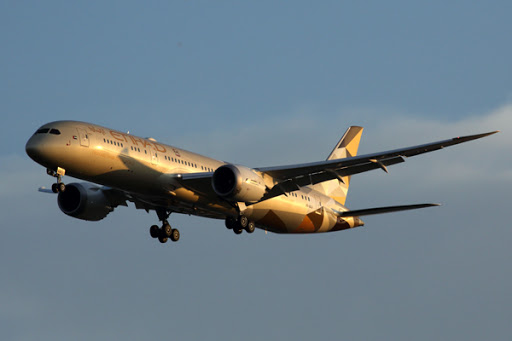
Amidst a host of firsts for the aviation industry, the COVID-19 outbreak has seen Etihad Airways operate the first direct commercial flight from the UAE to Israel.
A twin-jet Boeing 787-9 departed Abu Dhabi on 19 May bound for Tel Aviv, carrying humanitarian aid and medical supplies destined for Palestinian communities in the West Bank and Gaza areas. Israel Airports Authority later confirmed the cargo flight landed at Ben Gurion Airport.
“Etihad Airways operated a dedicated humanitarian cargo flight from Abu Dhabi to Tel Aviv on 19 May to provide medical supplies to the Palestinians,” the state-owned airline told The Associated Press. “The flight had no passengers on board.”
For the first time, an @etihad cargo plane just landed at Israel’s Ben-Gurion airport! Hopefully soon, we will see passenger flights, too. Having visited, I know the UAE is a fascinating place, and look to continue improving relations between our countries. pic.twitter.com/cfBEfTlE7y
— Danny Danon 🇮🇱 דני דנון (@dannydanon) May 19, 2020
The two countries have never established diplomatic ties since the state of Israel was first founded in 1954. Israeli aircraft are not permitted to cross through Emirati airspace, and all outbound cargo destined for the Jewish state must transit through a third country such as Jordan or Egypt.
Though the UAE does not formally recognise Israel, several senior Emirati officials have indicated a willingness to co-operate with the country in recent years, largely sparked by a mutual distrust of Iranian influence in the region. Speaking at the World Economic Forum in 2019, UAE Minister of State Anwar Gargash suggested that Palestinian statehood was “no longer possible” and called for closer ties with the Jewish state.
While no commercial flight has, til now, operated between the UAE and Israel, an embarrassing blunder in January 2019 saw a private jet carrying government officials from both countries make headlines around the world.
According to a report published by Emirati newspaper al Khaleej at the time, the flight carried Emirati foreign minister and the head of UAE intelligence Tahnoun bin Zayed.
For its part, Egypt has maintained scheduled passenger services between Cairo and Tel Aviv in keeping with the terms of a 1980 normalisation accord, although the central government has long been at pains to downplay this.
Canada’s Globe and Mail reported in 2011 that Egypt Air had created what it called a “phantom subsidiary”– Air Sinai – operating under IATA code 4D to fly this routing. At the time, the outlet reported that Air Sinai kept no website, no phone number, and operated just a single Boeing 737 with no logo or livery.




